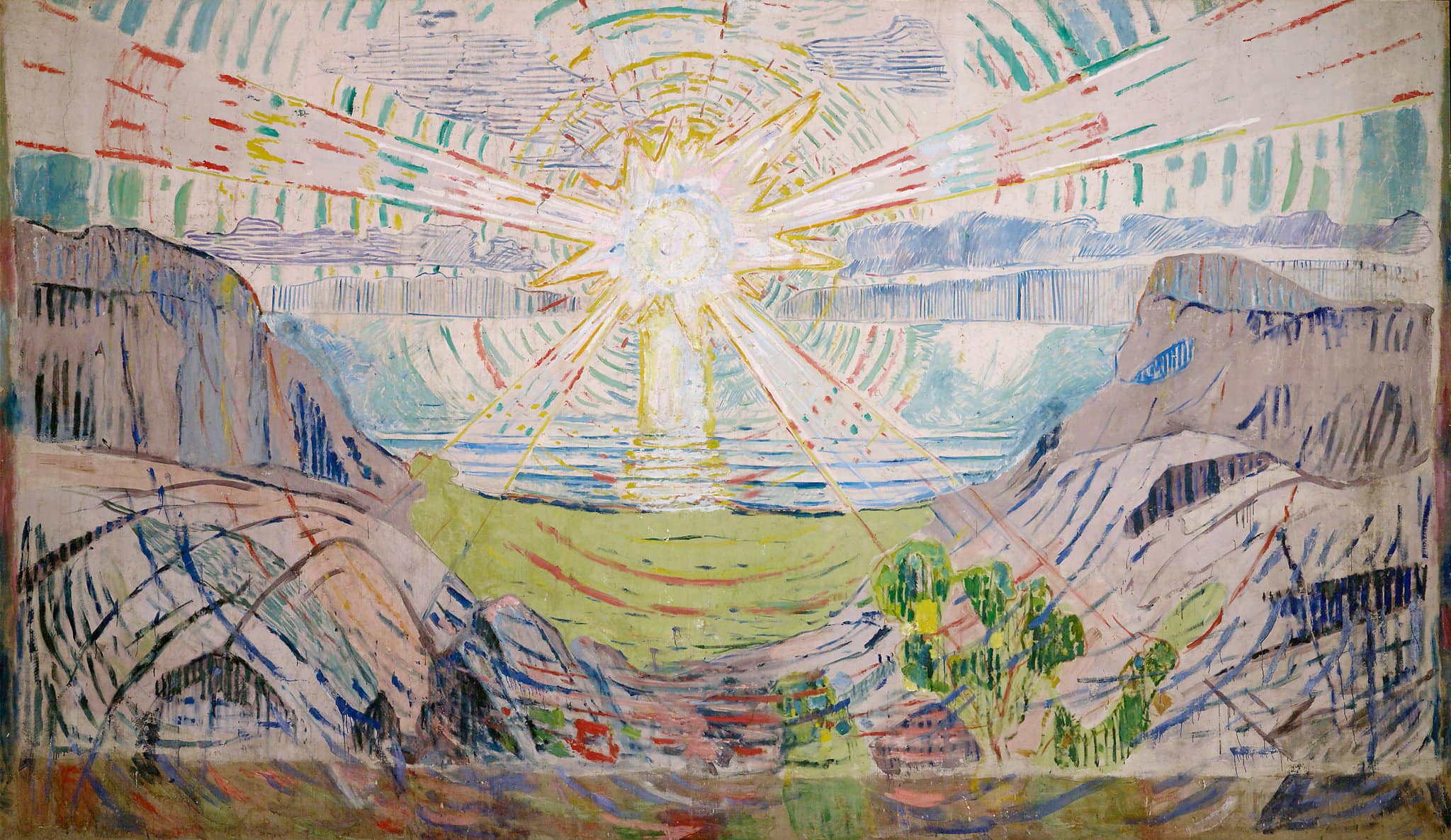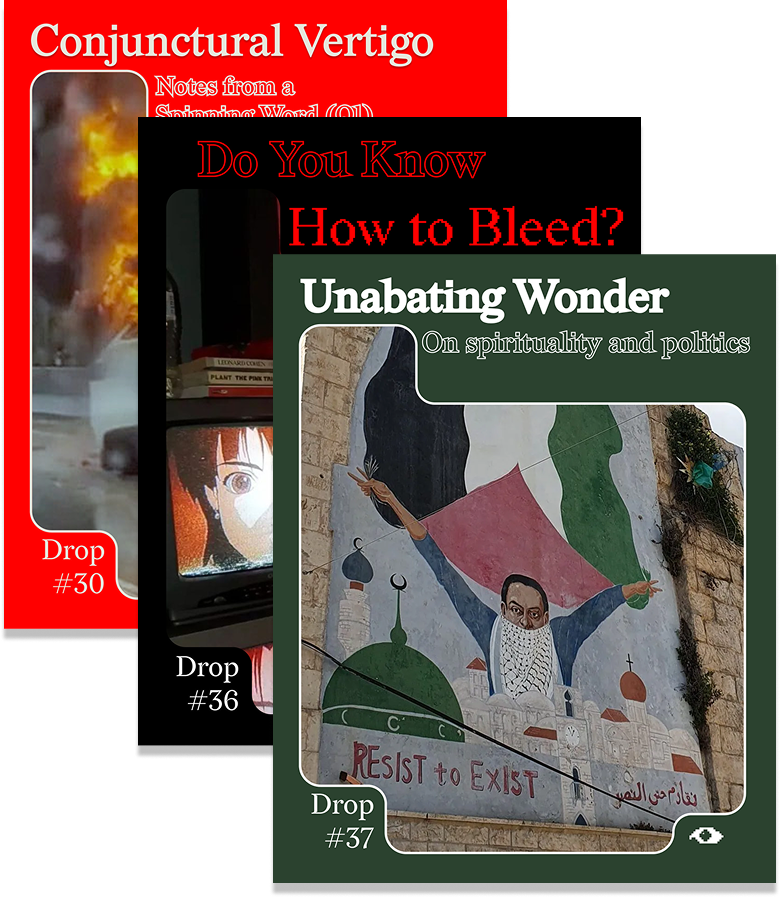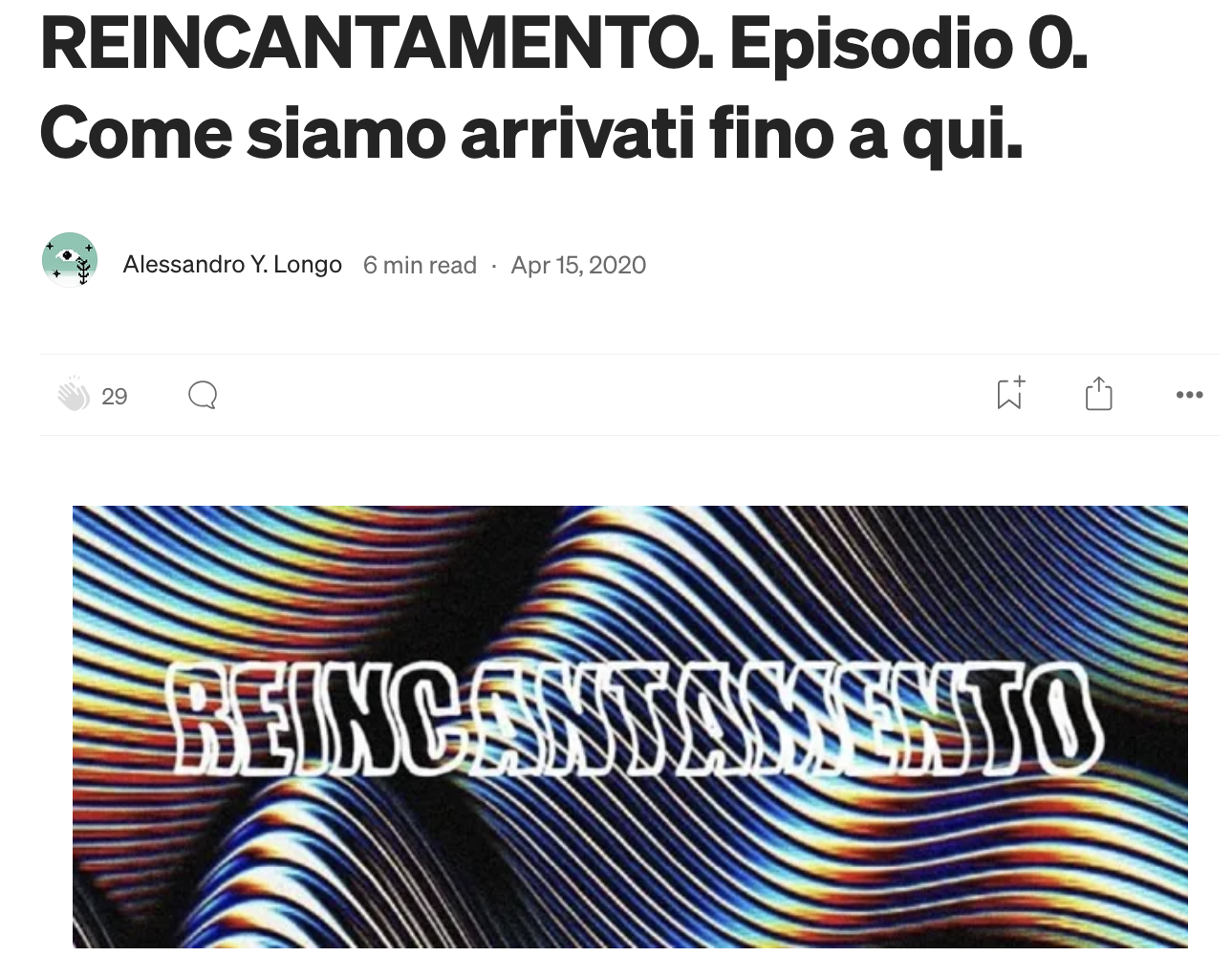Where are you?
This is the website of REINCANTAMENTO, welcome.
Born in 2020, REINCANTAMENTO is a Research and Publishing Group exploring the relationship between Technology, Radical Imagination and Rituality.
Based across Berlin, Venice, and Turin, we develop publications, workshops, video, and playful interventions that rethink our relationship with technology. REINCANTAMENTO creates sites of collective inquiry that work within wider networks of transformation beyond traditional disciplinary and institutional boundaries. Founded and maintained by Alessandro Y. Longo, REINCANTAMENTO includes Anna Fasolato, Matteo Osio, Kinked, Giorgio Craparo, Simone Robutti, and Jeein.
![]()
The concept of re-enchantment grounds our research, presenting itself as a speculative framework through which to re-signify the real. In an epoch where action appears paralyzed, we investigate the interstices where the possibility of agency still nests. Cultivating a philosophy of hope, we orchestrate networks of resistance and imagination that intertwine in the present.![]()
REINCANTAMENTO has collaborated with Panke Gallery, MFRU 2025, 0xSalon, Trust, Baltan Laboratories, HackThePromise Festival, NABA, Serpentine Galleries & RadicalXChange, SAVVY Contemporary, MoCa, MacTe, 48h Neukölln Festival 2023, C/O Digital Festival 2022, IAM Festival 2021, MiGarden, Almanac Torino, and with online magazines such as SCHON, Not, L’ Indiscreto, Singola.
What do we do?
REINCANTAMENTO work both with digital and physical publications. We operate DROPS - a online publication hosted on Substack, exploring the fractured landscape of the contemporary. Moving between technology, culture, politics, and collective imagination, DROPS features 35+ articles from both collective members and guest contributors. DROPS is published primarily in English with select Italian translations.
![]()
nCHANT is REINCANTAMENTO's new monographic magazine. As an oblique optical device for exploring unusual ideas, nCHANT represents a polyphonic, anti-disciplinary chorus of voices examining concepts at the membrane between culture and technology. nCHANT's inaugural issue, "On Digital Gardens". expands and situates the concept of digital garden: symbolic spaces that embody the desire for a post-capitalist Internet.

We organize workshops that function as collective rituals to foster technological, economic, and political imagination, and produce works like video-essays and games to crystallize speculative possibilities into affective artefacts. Game design plays a particularly important role because we see games as creating "pockets of reality" where different rules apply: spaces where people can experience alternative ways of organizing and perceiving the world.
Moreover, we are slowly kickstarting educational programs and strategy services to co-design digital tools within existing political and artistic communities, helping groups develop their own techno-social visions.
- The Writings section houses the archive of all of our articles.
- The Activities section includes all the artworks, workshops, projects, and other public interventions made IRL.
- The Videodrome hosts the archive of the two seasons of Speculum!, the program aired between 2020 and '21 on the Decamerette network. Speculum! involved Alessandro Y. Longo, Marco Mattei, and Vincenzo Grasso. During 2021, Speculum! was a newsletter, currently suspended but ready for future activations. Here you will also find the first video-essay we ever produced: Future Archaeology.
- Finally, the Garden section, a reworking of Tumblr style, is a confusing page of visual inspirations and HTML tricks, an experiment in curating jpg files, and a radical elaboration of the idea of repost. Find out more about it below.
![]()
REINCANTAMENTO’s first blogpost
REINCANTAMENTO originated as a series of articles by Alessandro, published on Medium in April 2020. This initial series delves into philosophical approaches to digital technologies, the issue of surveillance, the question of design, and possible solutions to enchant our tools once again. From this crucial philosophical framework, an online meditation with daily outreach on Instagram and article publications across various magazines emerged. In this phase, Speculum! was also born, a philosophical trio engaged in contemplating the idea of the future through YouTube and newsletters.
In 2022, REINCANTAMENTO moved to Berlin and begins organizing performances and workshops as an expansion of our philosophical research.
The process of web design has been oriented around the concept of
This is the website of REINCANTAMENTO, welcome.
Born in 2020, REINCANTAMENTO is a Research and Publishing Group exploring the relationship between Technology, Radical Imagination and Rituality.
Based across Berlin, Venice, and Turin, we develop publications, workshops, video, and playful interventions that rethink our relationship with technology. REINCANTAMENTO creates sites of collective inquiry that work within wider networks of transformation beyond traditional disciplinary and institutional boundaries. Founded and maintained by Alessandro Y. Longo, REINCANTAMENTO includes Anna Fasolato, Matteo Osio, Kinked, Giorgio Craparo, Simone Robutti, and Jeein.

The concept of re-enchantment grounds our research, presenting itself as a speculative framework through which to re-signify the real. In an epoch where action appears paralyzed, we investigate the interstices where the possibility of agency still nests. Cultivating a philosophy of hope, we orchestrate networks of resistance and imagination that intertwine in the present.

REINCANTAMENTO has collaborated with Panke Gallery, MFRU 2025, 0xSalon, Trust, Baltan Laboratories, HackThePromise Festival, NABA, Serpentine Galleries & RadicalXChange, SAVVY Contemporary, MoCa, MacTe, 48h Neukölln Festival 2023, C/O Digital Festival 2022, IAM Festival 2021, MiGarden, Almanac Torino, and with online magazines such as SCHON, Not, L’ Indiscreto, Singola.
What do we do?
REINCANTAMENTO work both with digital and physical publications. We operate DROPS - a online publication hosted on Substack, exploring the fractured landscape of the contemporary. Moving between technology, culture, politics, and collective imagination, DROPS features 35+ articles from both collective members and guest contributors. DROPS is published primarily in English with select Italian translations.

nCHANT is REINCANTAMENTO's new monographic magazine. As an oblique optical device for exploring unusual ideas, nCHANT represents a polyphonic, anti-disciplinary chorus of voices examining concepts at the membrane between culture and technology. nCHANT's inaugural issue, "On Digital Gardens". expands and situates the concept of digital garden: symbolic spaces that embody the desire for a post-capitalist Internet.

We organize workshops that function as collective rituals to foster technological, economic, and political imagination, and produce works like video-essays and games to crystallize speculative possibilities into affective artefacts. Game design plays a particularly important role because we see games as creating "pockets of reality" where different rules apply: spaces where people can experience alternative ways of organizing and perceiving the world.
Moreover, we are slowly kickstarting educational programs and strategy services to co-design digital tools within existing political and artistic communities, helping groups develop their own techno-social visions.
What will you find here?
- The Writings section houses the archive of all of our articles.
- The Activities section includes all the artworks, workshops, projects, and other public interventions made IRL.
- The Videodrome hosts the archive of the two seasons of Speculum!, the program aired between 2020 and '21 on the Decamerette network. Speculum! involved Alessandro Y. Longo, Marco Mattei, and Vincenzo Grasso. During 2021, Speculum! was a newsletter, currently suspended but ready for future activations. Here you will also find the first video-essay we ever produced: Future Archaeology.
- Finally, the Garden section, a reworking of Tumblr style, is a confusing page of visual inspirations and HTML tricks, an experiment in curating jpg files, and a radical elaboration of the idea of repost. Find out more about it below.
Our story

REINCANTAMENTO’s first blogpost
REINCANTAMENTO originated as a series of articles by Alessandro, published on Medium in April 2020. This initial series delves into philosophical approaches to digital technologies, the issue of surveillance, the question of design, and possible solutions to enchant our tools once again. From this crucial philosophical framework, an online meditation with daily outreach on Instagram and article publications across various magazines emerged. In this phase, Speculum! was also born, a philosophical trio engaged in contemplating the idea of the future through YouTube and newsletters.
In 2022, REINCANTAMENTO moved to Berlin and begins organizing performances and workshops as an expansion of our philosophical research.
The process of web design has been oriented around the concept of
digital garden
A concept dating back to Web 1.0, a digital garden is an experience that affects the senses, a cognitive space living an eternal work-in-progress, an oasis of cues, sparks and multimedia deluges. Compared to social media's logic:
“The Garden is our counterbalance. Gardens present information in a richly linked landscape that grows slowly over time. Everything is arranged and connected in ways that allow you to explore. [...] You get to actively choose which curiosity trail to follow, rather than defaulting to the algorithmically-filtered ephemeral stream. The garden helps us move away from time-bound streams and into contextual knowledge spaces. ”
Crossing different styles, from pixel-art to old cryptography manuals, via retro games, HD aesthetics and blogosphere frenzy, the first iteration of our garden is born. Far from being truly autonomous, this digital space is still a work-in-progress and further iterations are planned.
